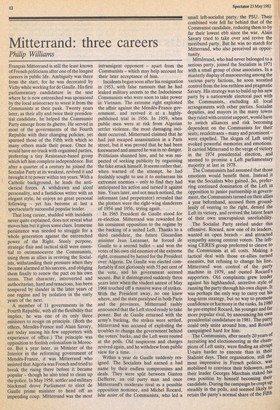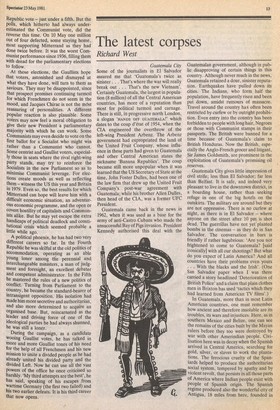Mitterrand: three careers
Philip Williams
Francois Mitterrand is still the least known of French politicians after one of the longest careers in public life. Ambiguity was there from the start, for he was decorated by Vichy while working for de Gaulle. His first parliamentary candidature in the seat where he is now entrenched was sponsored by the local aristocracy to wrest it from the Communists at their peak. Twenty years later, as their ally and twice their presidential candidate, he helped the Communist Party emerge from its ghetto. He served in most of the governments of the Fourth Republic with their changing policies, yet spurned those of the Fifth with which so many others made their peace. Once he would have no truck with organised parties, preferring a tiny Resistance-based group which left him complete independence. But after a quarter of a century he joined the Socialist Party at its weakest, revived it and brought it to power within ten years. With a Catholic background, he leads the anti clerical forces. A withdrawn and aloof personality, and a fastidious writer with an elegant style, he enjoys no great personal following — yet has become at last a spectacularly successful popular leader.
That long career, studded with incidents never quite explained, does not reveal what moves him but it gives some clues. Immense persistence was needed to struggle for a whole generation against the entrenched power of the Right. Steely purpose, strategic flair and tactical skill were essential to outmanoeuvre the Communists, using them as allies in reviving the Socialists, withstanding their pressure when they became alarmed at his success, and obliging them finally to renew the pact on his own terms. That character, introverted and authoritarian, hard and tenacious, has been tempered by slander in the later years of one regime and by isolation in the early years of the next.
A member of 11 governments in the Fourth Republic, with all the flexibility that implies, he was one of its only three ministers to resign on principle. (Both the others, Mends-France and Alain Savary, are today among his few supporters with experience of office.) The principle was opposition to foolish colonialism in Morocco. But a year later, as Minister of the Interior in the reforming government of Mendes-France, it was Mitterrand who insisted that Algeria was French and tried to break the rising there before it became popular — though he also tried to clean up the police. In May 1958, settler and military blackmail drove Parliament to elect de Gaulle prime minister to head off an impending coup. Mitterrand was the most intransigent opponent — apart from the Communists — which may help account for their later acceptance of him.
Incidents began soon after his resignation in 1953, with false rumours that he had leaked military secrets to the Indochinese Communists who were soon to take power in Vietnam. The extreme right exploited the affair against the Mendes-France gov ernment, and revived it at a highlypublicised trial in 1956. In 1959, when public men were at risk from Algerian settler violence, the most damaging incident occurred. Mitterrand claimed that he had just escaped assassination in a Paris street, but it was proved that he had been forewarned and assured he was in no danger. Politicians shunned him, and he was suspected of seeking publicity by organising the fake attack himself. It seems rather that, when warned of the attempt, he had foolishly sought to use it to embarrass his extremist enemies — only to find they had anticipated his action and turned it against him. Years later, and not much noticed, the informant (and perpetrator) revealed that the plotters were the right-wing slanderers of 1954 and 1956, trying again.
In 1965 President de Gaulle stood for re-election. Mitterrand was rewarded for his consistent opposition to the regime by the backing of a united Left. Thanks to a third candidate, the future Giscardian minister Jean Lecanuet, he forced de Gaulle to a second ballot — and won the votes of his own old enemies of the extreme right, consumed by hatred for the President over Algeria. De Gaulle was elected comfortably if not gloriously with 55 per cent of the vote, and his government seemed secure. But it disintegrated suddenly three years later when the student unrest of May 1968 touched off a massive wave of strikes. With the President away, no one knew where, and the state paralysed in both Paris and the provinces, Mitterrand rashly announced that the Left stood ready to take power. But de Gaulle returned with the army's backing, the strikes were settled, Mitterrand was accused of exploiting the troubles to change the government behind the voters' backs, and the Left were routed at the polls. Old suspicions and charges revived again, and he withdrew from public view for a time.
Within a year de Gaulle suddenly resigned. The Socialists had earned a bad name by their endless compromises and deals. They were split between Gaston Defferre, an old party man and once Mitterrand's moderate rival as a possible opposition nominee, and Michel Rocard, bête noire of the Communists, who led a combined vote fell far behind that of the Communist candidate, reducing them to by far their lowest ebb since the war. Alain Savary tried to take over and revive the moribund party. But he was no match for Mitterrand, who also perceived an opportunity.
Mitterrand, who had never belonged to a serious party, joined the Socialists in 1971 with a small group of close associates. In a masterly display of manoeuvring among the various party factions, he soon wrestled control from the less ruthless and pragmatic Savary. His strategy was to build up his new party by a nationwide electoral pact with the Communists, excluding all local arrangements with other parties. Socialist deputies, and mayors in the many towns they ruled with centrist support, would have to switch alliances and risk becoming dependent on the Communists for their seats; recalcitrants — many and prominent — were expelled. The slogan of Left unity evoked powerful memories and emotions. It carried Mitterrand to the verge of victory in the 1974 presidential election, and seemed to promise a Left parliamentary majority at last in 1978.
The Communists had assumed that those emotions would benefit them. Instead it was the Socialists who gained. So, preferring continued domination of the Left in opposition to junior partnership in government, the Communists turned on their allies a year beforehand, accused them groundlessly of veering to the right, denied the Left its victory, and revived the latent fears of their own unscrupulous unreliability.
The Socialist Party reeled under this offensive. Rocard, now one of its leaders, wanted an open breach — and attracted sympathy among centrist voters. The leftwing CERES group preferred to cleave to the Communists at all costs. Making a tactical deal with those ex-allies turned enemies, but refusing to change his line, Mitterrand won control of the party machine in 1979, and ousted Rocard's supporters. Old complaints grew louder against his highhanded, secretive style of running the party through his own clique. It was perhaps the only way to carry out his long-term strategy, but no way to promote confidence or harmony in the ranks. In 1980 he pre-empted Rocard, his younger and far more popular rival, by announcing his own presidential candidature in 1981. The party could only unite around him, and Rocard campaigned hard for him. The Communists, after nearly 20 years of recruiting and electioneering as the champions of Left unity, were finding an abrupt U-turn harder to execute than in their Stalinist days. Their organisation, still the most impressive in French politics, was mobilised to convince their followers, and their leader Georges Marchais staked his own position by himself becoming their candidate. During the campaign he crept UP steadily in the polls, and seemed likely to retain the party's normal share of the Fifth Republic vote — just under a fifth. But the polls, which hitherto had always underestimated the Communist vote, did the reverse this time. On 10 May one million out of four defected, some staying home, most supporting Mitterrand as they had done twice before. It was the worst Communist performance since 1936, filling them with dread for the parliamentary elections to follow.
At those elections, the Gaullists hope that voters, astonished and dismayed at what they have done, will turn to them as saviours. They may be disappointed, since that prospect promises continuing turmoil for which Frenchmen do not seem in the mood, and Jacques Chirac is not the mOst reassuring of personalities. A different Popular reaction is also plausible. Some voters may now feel a moral obligation to give their new President a parliamentary majority with which he can work. Some Communists may even decide to vote on the first ballot for a Socialist who might win rather than a Communist who cannot. Some centrist and Gaullist voters, especially those in seats where the rival right-wing Party stands, may try to reinforce the Socialists in the new Parliament so as to minimise Communist leverage. For elections create moods as well as reflecting them — witness the US this year and Britain in 1979. Even so, the best results for which Mitterrand can hope will leave him with a difficult economic situation, an adventurous economic programme, and the open or covert hostility of capitalists and Communists alike. But he may yet escape the extra handicaps of political deadlock and constitutional crisis which seemed probable a little while ago.
A political phoenix, he has had two very different careers so far. In the Fourth Republic he was skilful at the old politics of accommodation, operating as an able Young loner among the perennial and interchangeable ministers, a man of judgment and foresight, an excellent debater and competent administrator. In the Fifth he mastered the rules of a new politics of conflict. Turning from Parliament to the country, he became the standard-bearer of intransigent opposition. His isolation had made him more secretive and authoritarian, and also more determined to acquire an organised base. But, reincarnated as the leader and driving force of one of the Ideological parties he had always shunned, he was still a loner.
During the campaign, as a candidate wooing Gaullist votes, he has talked in more and more Gaullist tones of his need for the help of all Frenchmen and his new mission to unite a divided people as he had already united his divided party and the divided Left. Now he can use all the vast powers of the office he once criticised so harshly. 'My third attempts are the best', he has said, speaking of his escapes from wartime Germany (the first two failed) and his two earlier defeats. It is his third career that now opens.











































 Previous page
Previous page